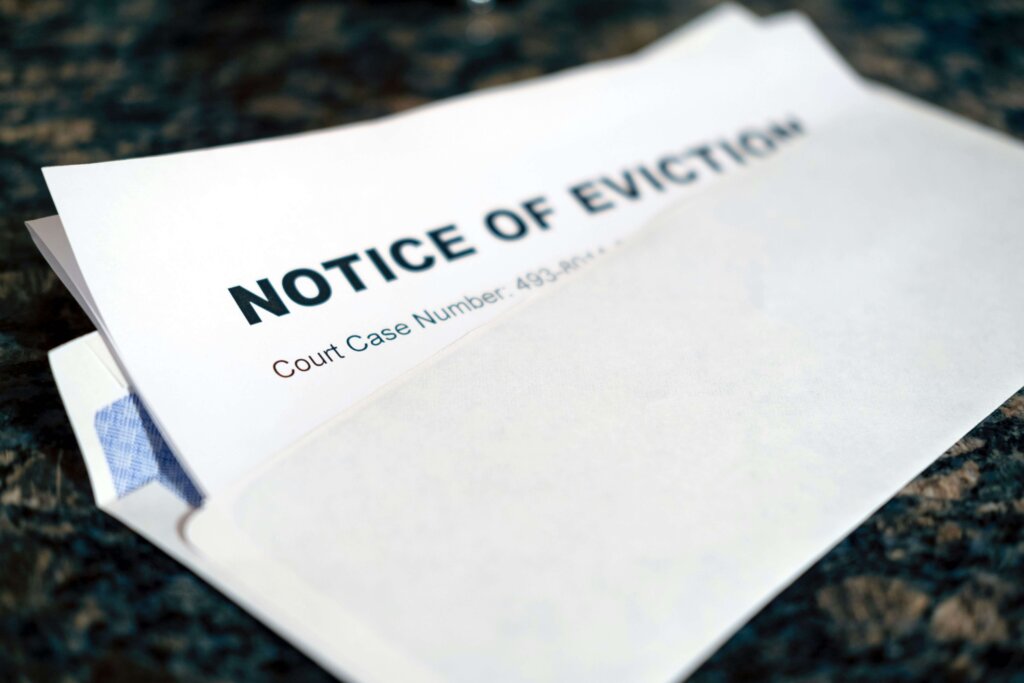Eviction is a legal process through which a landlord seeks to remove a tenant from a rental property. Navigating this process in Texas requires a comprehensive understanding of the legal landscape of landlord-tenant relationships.
Landlords must be well-versed in the specific grounds for eviction, the proper procedures for serving notices, and the steps involved in filing and pursuing an eviction lawsuit.
Likewise, tenants must know their rights under Texas law, including defenses they may invoke during eviction proceedings and resources available to help them navigate this challenging situation.
Texas eviction laws are designed to balance the interests of landlords and tenants, ensuring that disputes are resolved fairly per established legal principles. By delving into the nuances of eviction proceedings, we aim to empower landlords and tenants alike with the knowledge needed to manage this complex process.
Understanding Texas Eviction Laws

Key Regulations Governing Eviction Proceedings
Texas eviction laws form a critical framework governing the relationship between landlords and tenants. They outline procedures for lawful eviction processes and specify the rights and responsibilities of both parties, ensuring fair treatment throughout the eviction process.
Key aspects include the grounds for eviction, such as non-payment of rent or lease violations, and the requisite notices landlords must serve before initiating legal action.
Moreover, Texas law dictates the procedures for filing eviction lawsuits, conducting hearings, and executing eviction orders, aiming to balance the interests of property owners and tenants while upholding legal standards.
Difference Between Residential and Commercial Evictions
Within Texas, eviction laws differ significantly between residential and commercial properties. Residential evictions typically involve tenant-landlord disputes over lease violations or failure to pay rent. However, commercial evictions may arise from breaches of lease terms or tenant non-compliance with commercial lease agreements.
These differences necessitate distinct legal strategies and procedures for each property type, underscoring the importance of understanding Texas’ specific regulations governing residential and commercial evictions.
Grounds for Eviction in Texas
Non-payment of Rent
Evicting a tenant requires landlords to have valid legal grounds outlined in state law to ensure fair and lawful proceedings. One of the most common reasons for eviction is not paying rent. In Texas, if a tenant can’t pay rent as stipulated in the lease agreement, the landlord has the right to initiate eviction proceedings.
The process typically begins with the landlord serving a Notice to Vacate, giving the tenant a specified period to either pay the rental fee or vacate the property. If the tenant fails to comply, the landlord can proceed with filing an eviction lawsuit in court.
Lease Violations
Lease violations, including infractions such as unauthorized subletting, pet ownership contrary to lease terms, or engaging in illegal activities on the premises, also serve as grounds for eviction in Texas.
When alleging lease violations, landlords must provide clear evidence demonstrating that the tenant breached specific terms outlined in the lease agreement. This evidence may include written notices to the tenant addressing the violations and any subsequent communications or documentation related to the issue.
Other common grounds for eviction in Texas include holding over beyond the lease term and causing substantial property damage.
Notice Requirements

Types of Eviction Notices
In Texas, the eviction process begins with the landlord serving a proper eviction notice to the tenant. The duration of the notice period varies based on the purpose for eviction:
Notice to Vacate for Non-Payment of Rent
Typically, this notice gives the tenant three days to pay the overdue lease charges or leave the premises.
Notice to Vacate for Lease Violations
This notice also usually provides three days for the tenant to correct the violation or move out. However, the lease agreement or local ordinances may stipulate a different period.
Unconditional Notice to Vacate
In cases involving severe lease violations or illegal activities, the notice may require the tenant to leave immediately without the option to remedy the issue.
Ways to Serve Notice
Serving eviction notices correctly is critical to the eviction process in Texas. Notices must be delivered:
- In Person: The landlord or an agent can deliver the notice directly to the tenant or any occupant over 16 residing at the property.
- By Mail: Notices can be sent via certified mail with a return receipt requested. The notice period begins when the tenant receives the notice.
- Posting: If no one is available to receive the notice, the landlord can post it inside the main entry door.
Importance of Adhering to Notice Requirements
Landlords must strictly adhere to notice requirements to avoid delays or dismissals in eviction. Improperly served notices can lead to the court dismissing the eviction case, forcing the landlord to restart the process.
Accurate and timely notices ensure tenants get a fair opportunity to address the issue or prepare for relocation, a cornerstone of the due process in eviction proceedings.
Filing the Eviction Lawsuit
Step-by-Step Process of Filing an Eviction Lawsuit
1. Serve Notice to Vacate
Before filing a lawsuit, the landlord must properly serve a Notice to Vacate to the tenant, giving them a specified period to comply or leave the premises.
2. Prepare Documentation
Once the notice period has expired without compliance, the landlord can file an eviction lawsuit. They must gather all necessary documents, including the lease agreement, proof of notice served, and any evidence of lease violations or non-payment.
3. File the Petition
The landlord must file a Petition for Eviction with the Justice of the Peace court in the precinct where the property is located. This petition outlines the grounds for eviction and requests that the court grant the landlord possession of the property.
4. Pay the Filing Fee
The landlord must pay a filing fee, which varies by county. This fee is required to initiate the lawsuit.
5. Serve the Citation
After filing, the court will issue a citation to the renter, which must be served by a constable, sheriff, or authorized process server. This citation notifies the tenant of the lawsuit and the date of the court hearing.
6. Attend the Hearing
Both parties will present their case at the hearing. The landlord must provide evidence supporting the eviction, such as proof of non-payment or lease violations. The resident has the opportunity to present their defense.
7. Judgment
If the judge rules in favor of the proprietor (the landlord), a verdict for tenancy will be furnished. The leaseholder (the tenant) must vacate the property by the date specified in the judgment.
8. Writ of Possession
If the tenant does not leave voluntarily, the landlord can plea a Writ of Possession from the court. This permits law enforcement to remove them from the property.
Tenant’s Rights and Remedies

Overview of Tenant Rights During the Eviction Process
Right to Proper Notice
Tenants have the right to receive proper and timely notice before an eviction lawsuit can be filed. This includes receiving a Notice to Vacate that specifies the reason for eviction and the time frame they must comply or leave the premises.
Right to a Hearing
Residents are entitled to a court hearing to present their case and defend against the eviction. This hearing is a fundamental part of the legal process, ensuring they have a fair chance to contest the landlord’s claims.
Right to Appeal
If the court rules in favor of the landlord, tenants have the right to appeal the decision within a specified period.
Right to Withhold Rent
Sometimes, renters may hold onto rent or subtract repair expenses if the landlord fails to maintain the property in a habitable condition, as required by law.
Legal Remedies for Tenants to Contest Eviction
Challenge the Notice
Renters can contest the eviction by challenging the validity of the Notice to Vacate. If the notice was not served properly or does not meet legal requirements, the court may dismiss the eviction case.
Prove Compliance
Tenants can provide evidence that they have complied with the terms of the lease, such as proof of rent payments or documentation showing that alleged lease violations have been addressed.
Raise Habitability Issues
In eviction proceedings, occupants can argue that the landlord failed to maintain the property in a habitable condition. This can be a defense against eviction, especially if they have reported these issues and the landlord did not address them.
Invoke Retaliation Defense
If the eviction is believed to be retaliatory, the inhabitants can present evidence showing that the landlord’s actions are in response to exercising their legal rights.
Utilize Legal Aid
Tenants can seek legal assistance to ensure their rights are protected. Legal aid organizations can provide representation and advice on contesting an eviction.
The Bottom Line
Mastering the eviction intricacies is key for landlords and tenants. Landlords can ensure they handle the process correctly and efficiently by staying informed about the legal grounds for eviction, the necessary notice requirements, and the procedural steps involved in filing an eviction lawsuit.
On the other hand, tenants can better protect their rights and seek appropriate remedies when facing eviction. Don’t let legal complexities distress you — seek professional advice to manage these challenges confidently and ensure a fair outcome for all parties involved.If you’re looking to evict tenants and no longer want to deal with the hassle of renting, consider selling it property to A-List Properties for cash. We offer a quick and straightforward process so you can move on from your property swiftly and with peace of mind.

Zach Shelley
Zach Shelley is a seasoned real estate investor with a diverse network spanning across the nation. As the founder of his own real estate venture, Zach is committed to offering innovative solutions to homeowners facing various real estate challenges.. Through his dedication and strategic approach, Zach continues to make a significant impact in the real estate industry, providing homeowners with alternative pathways to navigate their property transactions.



